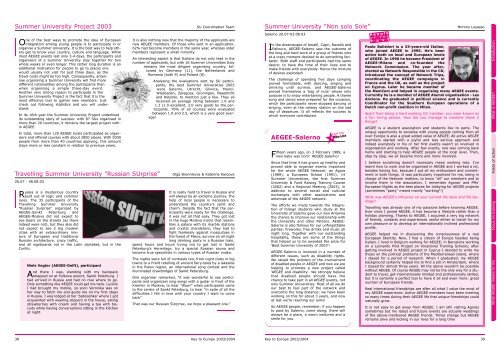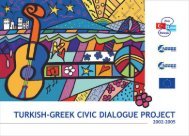Key 2003/2004 - AEGEE Europe
Key 2003/2004 - AEGEE Europe
Key 2003/2004 - AEGEE Europe
You also want an ePaper? Increase the reach of your titles
YUMPU automatically turns print PDFs into web optimized ePapers that Google loves.
Summer University Project <strong>2003</strong>ne of the best ways to promote the idea of <strong>Europe</strong>anOintegration among young people is to participate in ororganise a Summer University. It is the best way to help othersget to know your country, culture and language. Whilemost <strong>AEGEE</strong> events last only 3-4 days, the participants andorganisers of a Summer University stay together for twowhole weeks or even longer. This rather long duration is anadditional motivation for people to go to places onewould usually not visit for just three days, as thetravel costs might be too high. Consequently, antennaeorganising a Summer University will find moredifferent nationalities among the participants thanwhen organising a simple three-day event.Another very strong reason to participate in theSummer University Project is the fact that it is themost effective tool to gather new members. Justcheck out following statistics and you will understand:In its 16th year the Summer University Project underlinedits outstanding story of success: with 87 SUs organised inmore than 20 countries, it remains the largest project within<strong>AEGEE</strong>.In total, more than 120 <strong>AEGEE</strong> locals participated as organisersand offered courses with about 2800 places. With 5000people from more than 40 countries applying, this amountstays more or less constant in relation to previous years.Travelling Summer University "Russian SUrprise"26.07 - 08.08.03ussia is a mysterious countryRbuilt out of logic and commonrules. The 35 participants of theTravelling Summer University"Russian Surprise" organized by<strong>AEGEE</strong>-Sankt Peterburg and<strong>AEGEE</strong>-Moskva did not expect tosee bears on the streets (as thereindeed were not), but they also didnot expect to see 2 big moderncities with an extraordinary mixtureof <strong>Europe</strong>an and traditionalRussian architecture, crazy traffic,and all signboards not in the Latin alphabet, but in theCyrillic.Niels Vegter (<strong>AEGEE</strong>-Delft), participantnd there I was, standing with my backpackAstrapped on at Pulkova airport, Sankt Peterburg. Ihad arrived in Russia and had no clue where to go.Only something like <strong>AEGEE</strong> could get me here. LuckilyI had brought my mobile, so soon Veronika was onher way to fetch me and guide me on my first stepsin Russia. I was lodged at her 'babooshka' where I gotacquainted with wearing slippers in the house, eatingstrawberries with cream and having a tea with biscuitswhile having conversations sitting in the kitchenat night.SU Coordination TeamIt is also nothing new that the majority of the applicants arenew <strong>AEGEE</strong> members. Of those who sent in an application,62% had become members in the same year, whereas oldermembers represent a small minority.An interesting aspect is that Italians do not only lead in thenumber of applicants, but with 16 Summer Universities Italyremains the most diligent organising country, followedby Germany (11), the Netherlands andRomania (both 9) and Poland (8).Analysing the evaluations sent by SU participants,the best Summer Universities <strong>2003</strong>were Salerno, Utrecht, Gliwice, Mainz-Wiesbaden, Zaragoza, Groningen, Maastrichtand Helsinki, to mention just a few. They allreceived an average rating between 1.0 and1.2 (1.0 excellent, 2.0 very good) by the participants.70% of all courses were evaluatedbetween 1.0 and 2.5, which is a very good average!Olga Bronnikova & Katerina KarpovaIt is really hard to travel in Russia andwill always be an extreme journey. Thehelp of local people is necessary tounderstand the country's spirit andcharm. Despite the fact that the participantswere ready for the challenge,it was not all that easy. They got lostin the huge Moskva metro that resemblesa palace with its marble stationsand crystal chandeliers; they had tofight fearlessly against mosquitoes inthe forest of Pskov, survive an all nightlong drinking party in a Russian train,spend hours and hours trying not to get lost in SanktPeterburg's Hermitage, try a special Russian sauna andbecome true specialists in various types of Russian vodka.The nights were full of contrasts too, from night clubs in bigtowns to a firelit retelling of ancient fairy-tales by a lakesidein the Pskov region, an international song contest and theilluminated drawbridges of Sankt Petersburg.One organiser remarked, "it was wonderful to see participantsand organizers sing songs with a guitar in front of theKremlin in Moskva, to hear "Wow!" when participants cameto the centre of Sankt Peterburg, to hear "in spite of all thedifficulties I felt in love with your country I want to comeback"That was our Russian SUrprise, we hope a pleasant one."Summer University "Non solo Sole”Salerno 20.07-03.08.03n the dreamscape of Amalfi, Capri, Ravello andIPalinuro, <strong>AEGEE</strong>-Salerno saw the outcome ofthe long and hard work of a group of friends whoat a crazy moment decided to do something fantastic.Both staff and participants had the samedesire: to have the time of their lives and tomake friends with everybody. Hence the mixtureof desires exploded!The challenge of spending five days campingproved formidable, with dancing, singing anddrinking until sunrise, and <strong>AEGEE</strong>-Salernoproved themselves a 'bag of nuts' whose onlypurpose is to enjoy entertaining people. A themesong and dance were prepared for the occasion,which the participants never stopped dancing orsinging, even at the railway station on the sadday of departure. It all reflects the success towhich everyone contributed.<strong>AEGEE</strong>-SalernoStarringAntennaifteen years ago, on 3 February 1989, aFnew baby was born: <strong>AEGEE</strong>-Salerno!Since that time it has grown up healthy andproved able to organize events importantfor the whole <strong>AEGEE</strong> Network: an Agora(1989), a <strong>Europe</strong>an School (1991), 14Summer Universities, the first SummerUniversity & Fund Raising Training Course(2002) and a Regional Meeting (<strong>2003</strong>), inaddition to several social and culturalexchanges with other associations andantennae of the <strong>AEGEE</strong> network.The efforts we made towards the integrationof foreign students who study at theUniversity of Salerno gave our new Antennathe chance to improve our relationship withthe University and other Patrons. <strong>AEGEE</strong>-Salerno is also famous for our unforgettableparties: fireworks, free drinks and music allnight long. Together with our outstandinghospitality, these are some of the thingsthat helped us to be awarded the prize for'Best Summer University of <strong>2003</strong>'!<strong>AEGEE</strong>-Salerno is involved in a number ofdifferent issues, such as disability rights.We raised the problem of the involvementof disabled people in <strong>AEGEE</strong> and now we arehelping to promote a new project called'<strong>AEGEE</strong> and disability'. We strongly believethat disabled people should have thechance to take part in all <strong>AEGEE</strong> events, notonly Summer Universities. Most of all we doour best to feel part of the network andovercome the long distance; we have beenworking on this for about 3 years, and nowat last we're reaching our aims!So <strong>AEGEE</strong> people, remember: if you happento pass by Salerno, come along; there willalways be a place, a warm welcome and asmile for you.Peopleo f t h eP a s tMimmo LosassoPaolo Balistieri is a 33-years-old Italian,who joined <strong>AEGEE</strong> in 1995. He's beenactive both on local and <strong>Europe</strong>an levelsof <strong>AEGEE</strong>. In 1996 he became President of<strong>AEGEE</strong>-Milano and co-founded theNetwork Commission. The year after,elected as Network Responsible in the CD,introduced the concept of Network Trips,coordinating the <strong>AEGEE</strong> campaigns inFrance and the UK, as well as the projecton Cyprus. Later he became member ofthe MemCom and helped in organising many <strong>AEGEE</strong> events.Currently he is a member of <strong>AEGEE</strong> Alumni organisation - LesAnciens. He graduated in political science and is currentlyCoordinator for the Southern <strong>Europe</strong>an operations of aDutch non-profit coalition in Milan.Apart from being a hard working CD member, you were known asa fun loving person. How did you manage to combine those 2things?<strong>AEGEE</strong> is a student association and students like to party. Theunique opportunity to socialise with young people coming from allover <strong>Europe</strong> is also a great added value of <strong>AEGEE</strong>. All active <strong>AEGEE</strong>members started with a joyful and less serious approach andindeed everybody in his or her first events wasn't so involved inorganisation and working. After few events, one was coming backhome and starting to help <strong>AEGEE</strong> people at the local level. Then,step by step, we all became more and more involved.I believe socialising doesn't necessary mean working less: I'velearnt how to work and be organised in <strong>AEGEE</strong> and I worked a lot,besides having fun, because I put all my enthusiasm and commitmentin both things. It was particularly important for me, being incharge of the Network matters, to know "all" our members and toinvolve them in the association. I remember Agoras' and PMs'<strong>Europe</strong>an Nights as the best places for lobbying for <strong>AEGEE</strong> projects(sometimes "party" meant mainly "working"!)What was <strong>AEGEE</strong>'s influence on your current life style and life ideology?Travelling was already one of my passions before knowing <strong>AEGEE</strong>.Ever since I joined <strong>AEGEE</strong>, it has become a lifestyle rather than aholiday planning. Thanks to <strong>AEGEE</strong>, I acquired a very big networkof friends, contacts and experiences useful either to travel for myown pleasure or to develop an internationally inclined professionalprofile.<strong>AEGEE</strong> helped me in discovering the consciousness of a real<strong>Europe</strong>an Identity. Now, I feel a citizen of <strong>Europe</strong> besides beingItalian. I lived in Belgium working for <strong>AEGEE</strong>; in Barcelona workingon a Leonardo Pilot Project on Vocational Training Schools; aftergetting involved in <strong>AEGEE</strong> project in Cyprus I decided to write mythesis on the political problems of the Mediterranean island, whereI stayed for a period of research. When I graduated, my <strong>AEGEE</strong>background certainly helped me to find a job in Amsterdam, whereI stayed for almost three years. All the above wouldn't be possiblewithout <strong>AEGEE</strong>. Of course <strong>AEGEE</strong> may not be the only way for a studentto travel, get internationally minded and professionally skilled,but it is certainly a perfect tool to have it all and even more: greatnumber of <strong>Europe</strong>an friends.Real international friendships are after all what I value the most ofmy <strong>AEGEE</strong> experience. Active <strong>AEGEE</strong> members have been meetingso many times during their <strong>AEGEE</strong> life that unique friendships couldnaturally grow.It is not easy to get away from <strong>AEGEE</strong>. I am still visiting Agorassometimes but my latest and future events are actually weddingsof the above-mentioned <strong>AEGEE</strong> friends. Times change but <strong>AEGEE</strong>remains alive and kicking in our lives for a long timeWhat <strong>AEGEE</strong> means to me Focus on training Fields of action What is <strong>AEGEE</strong>? Introduction38 <strong>Key</strong> to <strong>Europe</strong> <strong>2003</strong>/<strong>2004</strong><strong>Key</strong> to <strong>Europe</strong> <strong>2003</strong>/<strong>2004</strong>39







